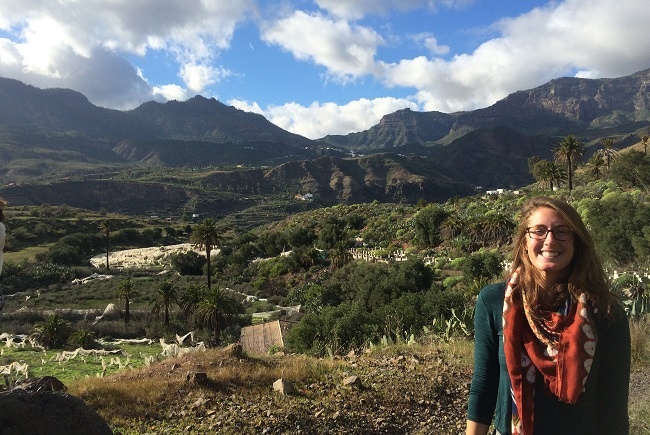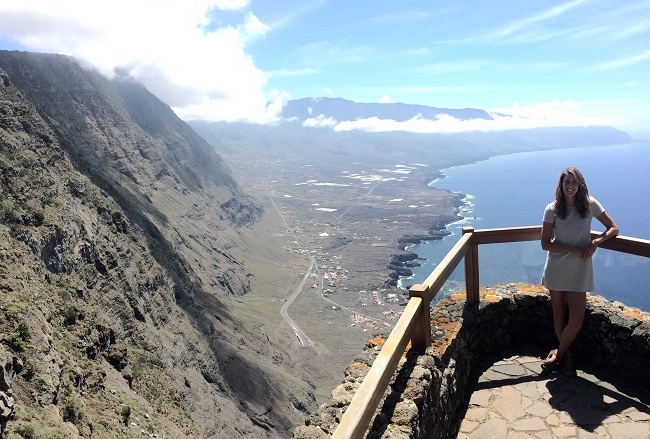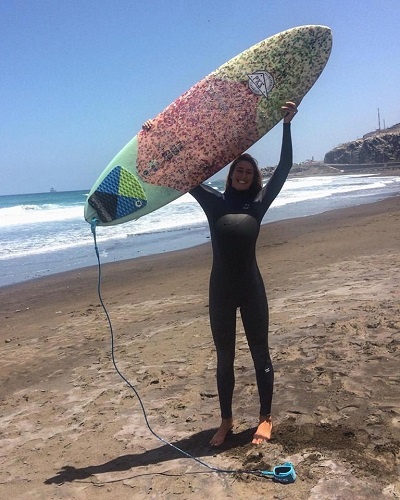Teaching English in Las Palmas de Gran Canaria, Spain: Alumni Q&A with Lauren Turner
International TEFL Academy graduate Lauren Turner discusses her experience teaching English in the Spanish Government's Auxiliares de Conversacion Program (also known as the North American Language & Culture Assistants Program).
Written By: International TEFL Academy | Updated: June 29, 2023
Written By: International TEFL Academy
Updated: June 29, 2023

International TEFL Academy graduate Lauren Turner discusses all aspects of her life teaching English in the Canary Islands through the Spanish Government's Auxiliares de Conversacion Program (also known as the North American Language and Culture Assistants Program). Learn about key tips about TEFL jobs in Gran Canaria, including, TEFL certification, how to get a job, salaries, & visas.
A First-Hand Look at English TEFL Jobs in Gran Canaria (Canary Islands), Spain
What is your citizenship?
United States
What city and state are you from?
Burlington, Vermont
How old are you?
24
What is your education level and background?
Bachelor's degree
Have you traveled abroad in the past?
Some international travel with friends, family, business, etc.
If you have traveled abroad in the past, where have you been?
Spain, Italy, France, England, Germany, Ireland, Dominican Republic, Colombia, Ghana
If you have studied abroad in the past, where did you study?
Cusco, Peru
What sparked your interest in going to teach English abroad?
I grew up traveling and always knew I wanted to find a job that allowed me to live in different countries. I had done some ESL tutoring while in university, and when I realized I could turn it into a job, I knew it was the right solution for me.
What were some of your concerns before teaching abroad?
My main concern was being able to make enough money to support myself, but still be able to travel.
What did your friends and family think about you moving and teaching abroad?
My friends and family were very supportive. They know I love to travel and were excited I found a way to do so.

TEFL CLASS INFORMATION
Why did you decide to get TEFL certified and choose International TEFL Academy?
I wanted to get TEFL certified so that I could improve my teaching methodology and to be able show future employers that I am qualified to teach. Although I had some experience with ESL tutoring, I did not feel comfortable or prepared to teach in front of a full class. I did quite a lot of research on different certifications and found that ITA seemed like the best option for me.
Which TEFL certification course did you take?
How did you like the course?
I really liked the Chicago TEFL course. The instructors were very helpful and provided different perspectives on teaching English. For me, the practicum was the most useful part of the course. It allowed me to put into practice everything that I was learning in class, and an instructor was there to evaluate and critique my teaching afterward.
Another aspect I liked about taking the course in Chicago is that I had easy access to all of the ITA staff. Instead of having to send an email or make a phone call, I could just pop by their desks to talk in person.

How has your TEFL training helped you in your current teaching position?
My TEFL training has helped me in a number of ways specifically in teaching students with different learning styles. The course helped me to identify when one learning style may not apply to another student, and how to approach a subject in a variety of ways.
Which city and country did you decide to teach English in and why?
I decided to teach English in Spain in Las Palmas de Gran Canaria. I wanted to teach in a Spanish-speaking country so that I could not only teach English but also improve my Spanish. After a year of teaching in Girona, Spain, I wanted a change and decided on the Canary Islands. I wanted to remain in Spain but with a change of pace, the island life seemed perfect.
 How long have you been in this country and how long do you plan to stay?
How long have you been in this country and how long do you plan to stay?
I have been teaching in Spain for a total of about two years, and have not yet decided on an end date.
What school, company, or program are you working for?
North American Language and Culture Assistants in Spain
During which months does your school typically hire?
January-April
Did you secure this position in advance of arriving?
Yes
How did you interview for this position?
There was no interview, only an online application.
What kind of visa did you enter on?
Student Visa
Please explain the visa process that you went through.
To get my initial student visa, I had to go through the process at the Spanish Consulate in Washington, DC. Each consulate has different requirements which can be found on their respective websites. If renewing with the program for another year, it is possible to extend the visa without leaving Spain.
Read more: What Visa Do I Need to Teach English in Spain?
What are the qualifications that your school requires for teachers? Please check all that apply
- Native English speaker
- Bachelor's Degree
Read more: What Are the Basic Requirements for Teaching English in Spain?
What is the best way to apply?
Apply online
[Editor's note: Read more about the Cultural Ambassadors Program to learn more about the application process.]
Tell us about your English teaching job!
I work 12 hours a week and make 700 euros a month. This salary is enough to live off of, but I also give private classes at 15€/hr as a supplement to be able to save more. I work at two public primary schools, teaching students from 6-12 years old. My role at the school is a language assistant, so I work alongside a head teacher and focus mainly on speaking skills.
Spain is also trying to increase bilingualism in the education system, so I also work in some of the science classes. I only work Tuesday-Friday, so every week I have three-day weekends. The public school system has about two weeks of vacation for Christmas and New Year, one week for Easter, as well as other national and local holidays resulting in quite a few extra long weekends.
Read more: How Much Do English Teachers Make in Spain?
How did you find somewhere to live and what is it like? Do you have roommates?
I have lived in various apartments in Spain and always used online resources such as idealista, milanunicios, easyRoommate and Facebook groups of university students in the area to start my search, but made sure to see the apartments in person before accepting anything.
COUNTRY INFORMATION - FUN!

Please explain the cultural aspects, public transportation, nightlife, social activities, food, expat community, dating scene, travel opportunities, etc...
Although the Canary Islands are part of Spain, they have a life of their own. You can still find tapas and paella, siestas and late-night dinners, but the islands are even more laid back than the peninsula (which you probably didn't think was possible). They take "no pasa nada" to a whole new level. In Gran Canaria, you will find many British and German tourists as well as a large number of international students doing their Erasmus study abroad at the University of Las Palmas.
There are always a number of events going on, but it will probably be easier to meet more foreigners than local Canarians. Las Palmas is a very physically active city and every day it is guaranteed you will see people playing beach volley, tennis, football (soccer), and running along Las Canteras beach. Thanks to pretty great waves and temperature, you can surf and body-board year round. I'm lucky enough to live just a few steps from the beach, making it easy to grab my surfboard when I get back from school and head to the water just about every day. Las Canteras is an urban beach so it's a great mix of nature and city life.
You can have a coffee on the promenade while watching the surfers, maybe catch a glimpse of the neighboring island Tenerife if it's not too cloudy, check out one of the outdoor concerts on a Saturday evening, or head to a club in the late hours of the night. At times living on an island can feel a bit claustrophobic, but fortunately, Gran Canaria has an international airport with direct flights to a number of destinations. It's also easy to catch a cheap flight to Madrid or Barcelona and pop back over to the peninsula.
If you register as a resident in the Canary Islands, you are eligible for discounted travel between the islands and the peninsula, making traveling even cheaper. It's also pretty easy to travel between islands. There are flights and ferries daily.
COUNTRY INFORMATION - MONEY
What are your monthly expenses?
Rent: €200-300 ($240 - $360 USD) -As I said, I've changed apartments several times
Food: €100-150 ($120 - $180 USD)
Transportation: €200 ($240 USD) - My schools are not in the same city I live in, so I rely on public buses
Phone: €10 ($12 USD)
Travel: €50-200 ($60 - $240 USD) - I don't typically travel every month
How would you describe your standard of living?
Comfortable, but nothing near glamorous.
In your opinion, how much does someone need to earn in order to live comfortably?
Depends on your definition of comfortable, but with between €700-1000 ($840 - $1200 USD) a month you'll be perfectly fine.

ADVICE FOR PROSPECTIVE ENGLISH TEACHERS
What advice would you give someone planning or considering teaching abroad? Would you recommend teaching in your country?
Teaching abroad is a great way to immerse yourself in another culture and experience different ways of life, and I would highly recommend checking out teaching English in Spain!
Go further:
- How to Get an English Teaching Job in Spain
- What To Know Before Moving to Spain to Teach English [Ultimate Cheat Sheet]
Posted In: Teach English in Spain, Chicago TEFL Class, Teach English in Europe, Las Palmas de Gran Canaria
International TEFL Academy
Founded in 2010, International TEFL Academy is a world leader in TEFL certification for teaching English abroad & teaching English online. ITA offers accredited TEFL certification courses online & in 20+ locations worldwide and has received multiple awards & widespread recognition as one of the best TEFL schools in the world. ITA provides all students and graduates with lifetime job search guidance. ITA has certified more than 40,000 English teachers and our graduates are currently teaching in 80 countries worldwide.
Want to Learn More About Teaching English Abroad & Online?
Request a free brochure or call 773-634-9900 to speak with an expert advisor about all aspects of TEFL certification and teaching English abroad or online, including the hiring process, salaries, visas, TEFL class options, job placement assistance and more.








